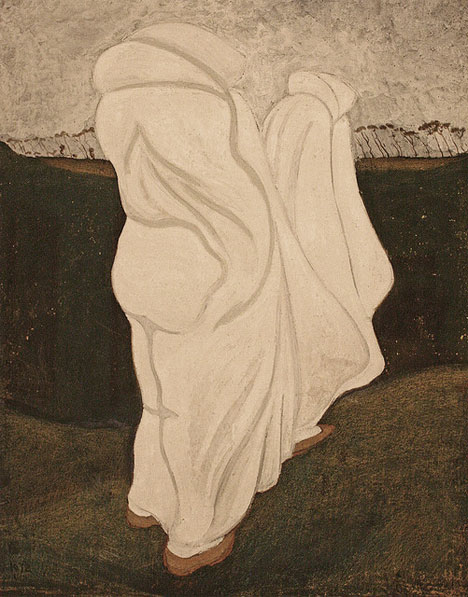Oct
1
2014

-
“If the creed is not considered dangerous, divine worship is emasculated.”
A creed is either worthless or worth everything we have. Here’s a classic quote from an essay by Eugen Rosenstock-Huessy entitled “The Peace of the Pirates” in Planetary Service (1978).
I have had the honor to have been considered a public danger more than once in my life. The first time was in 1912 when I wrote, “Language is wiser than the person who speaks it.” My thesis almost foundered on this disturbing reality of the Holy Spirit which I had perceived. Balaam’s ass was considered unscientific!
Continue reading
Comments Off | tags: Eugen Rosenstock-Huessy | posted in Apologetics, Quotes
Jul
30
2014

“Far more can be known about the early recorded history of mankind than is generally allowed, and what is revealed by this history is a story that is very different indeed from the one that we are used to hearing.”
Those who take Genesis 1-11 as literal history are considered ignorant by the “more respectable” echelons of Christian academia. But it turns out that it is these scholars who are the ignorant ones, and there is documentary evidence to prove it. Two thousand years of recorded history which corroborates the testimony of the Bible was deliberately ignored and is excluded from the modern curricula. Bill Cooper writes that this evidence is not difficult either to access or to read, which means that much of Christian scholarship has either been duped by secular historians about the historicity of Genesis, or is deliberately lying to the people of God.
Continue reading
1 comment | tags: Bill Cooper, Genesis, Josephus, Secular humanism | posted in Apologetics, Creation, Quotes
May
4
2014

or The Time Appointed by the Father
The Bible is a musical book. It plays the same tune over and over again. However, much of modern Bible scholarship refuses to be caught up in the flow, instead limiting its practice to the particulars. Instead of recognising themes and motifs, it boils down to ”Look, there’s another B flat.” The historical-grammatical method is an instrument which refuses to submit to the music for fear it might get carried away.
Peter Leithart follows the tune concerning the meaning of stoicheia. He has not only identified a B flat, but how it is used in the literary composition – its significance in the Covenant tune as it is presented to us by God, and as it plays out in history. I’ll quote his post, and then I will allow the same tune to carry him somewhere he does not want to go.
Continue reading
Comments Off | tags: Baptism, Covenant Theology, James Jordan, Peter Leithart | posted in Bible Matrix, Biblical Theology, Quotes
Apr
22
2014
James B. Jordan discusses the Confessions and Confessionalism with Steve Wilkins.
“Open the Bible and let the lion loose…”
Comments Off | tags: Church History, James Jordan | posted in Biblical Theology, Quotes
Apr
7
2014
or What Are You Looking At?
by Steven Opp

I feel their eyes all over me
Itʼs lookinʼ like conspiracy
Iʼm outta friends that I can trust
Maybe theyʼre onto us!
- Needtobreathe: “Maybe Theyʼre Onto Us”
Everybody knows what the word “paranoid” means. Itʼs when somebody is irrationally afraid of something. People who are paranoid are always on the lookout for what might jump out and get them. Comedian Richard Lewis understands this: “Even at home, on my stationary exercise bike, I have a rearview mirror.”
Continue reading
2 comments | tags: Doug Wilson, Steven Opp | posted in Biblical Theology, Christian Life, Ethics, Quotes
Feb
9
2014

“Show me your tomes, and I will draw you a napkin.”
The usual way to approach a theological problem is to read just about everything written on the subject by just about everybody else, and quote just about every one of them in a book that almost nobody is going to read. And the result most often looks like the same landscape just slightly rearranged. There is little or no progress.
This post has been slain and resurrected for inclusion in my 2015 book of essays, Inquietude.
Continue reading
Comments Off | posted in Bible Matrix, Biblical Theology, Quotes
Jan
16
2014
or Baptism into Baal

Then you shall say to Pharaoh,
‘Thus says the Lord,
Israel is my firstborn son,
and I say to you,
“Let my son go that he may serve me.”
If you refuse to let him go,
behold,
I will kill your firstborn son.’”
(Exodus 4:22)
My Federal Vision friends believe baptism is an important subject, from both theological and pastoral points of view. I agree, but for me it is also an issue of aesthetics. The Bible has a wonderfully consistent internal logic, and paedobaptism crunches the gears at every turn.
Peter Leithart just posted something concerning baptism, and it’s worth answering, not only “because somebody on the internet is wrong,” but also because it is an issue I’ve just finished dealing with in The Shape of Galatians. It should be noted that Trinity House is hosting some lectures on sacraments by a baptist, so Dr Leithart and his colleagues have a spirit that should be imitated by theologians everywhere. My own posts here are always bait in the hope of a bite, a friendly disputatio, so don’t take them the wrong way. If a friend has soup on his tie, or wax in his ear, or a fertility rite in his sacrament, what sort of friend isn’t going to point it out!?
Continue reading
4 comments | tags: Abel, Abraham, Baptism, Cain, Federal Vision, Galatians, Genesis, Numbers, Paul, Peter Leithart, Romans, The Shape of Galatians | posted in Bible Matrix, Biblical Theology, Quotes
Jan
7
2014

For God, who said, “Let light shine out of darkness,” has shone in our hearts to give the light of the knowledge of the glory of God in the face of Jesus Christ. (2 Corinthians 4:6).
This post has been slain and resurrected for inclusion in my 2015 book of essays, Inquietude.
Continue reading
Comments Off | tags: David, Doug Wilson, Revelation, Tabernacle | posted in Biblical Theology, Quotes
Dec
20
2013

God loves His architecture. The first chapter of the Bible is architecture. The books of Moses and the book of Revelation are filled with architecture, and the same floorplan underlies every book in between. Most Christians don’t understand the Bible’s architecture and modern Christians not only do not understand it, they do not care for it. But God loves His architecture. To love the Bible one must love its architecture. To understand the Bible, one must let the architecture inform one’s understanding.
Continue reading
Comments Off | tags: Abel, Baptism, Cain, Circumcision, Covenant curse, Covenant Theology, Genesis, High Priest, Numbers, Peter Leithart | posted in Biblical Theology, Quotes

































